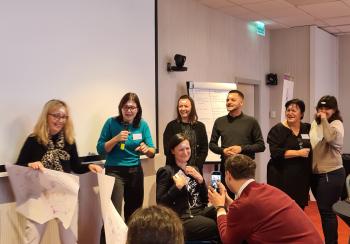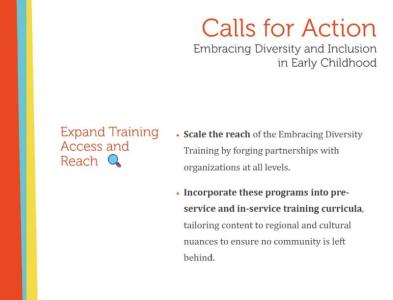A transformative event unfolded in Warsaw, Poland, this past November, where 28 dedicated early childhood professionals from 13 countries gathered for a Training of Trainers program on Embracing Diversity. From Bosnia and Herzegovina to Mongolia, these participants—representing ISSA member organizations—shared a common goal: to champion diversity, inclusion, and equity in early childhood education. Over four immersive days, from November 13-16, they explored new ideas, strategies, and tools to break down barriers and build environments where every child, regardless of background, feels seen, respected, and supported.
More than a learning experience, this Training of Trainers was a call to action. Led by the International Step by Step Association (ISSA) under the Early Childhood Workforce Initiative (ECWI) and supported by the Regional Network Fund, the program became a catalyst for systemic change. It serves as a vital platform for early childhood professionals to confront pressing challenges related to exclusion and discrimination. Through this transformative training, practitioners from diverse roles and contexts gained practical tools and insights to explore their own biases and create inclusive environments that foster equity and mutual respect. The collective experiences of the participants reveal an impact that transcends individual contexts, laying the groundwork for a more inclusive and democratic future.
What we learned from training participants
Two ISSA programs that empower adults working with and for children to foster equity, inclusion, and respect for diversity:
- Embracing Diversity: Creating Equitable Societies Through Personal Transformation
- Education for Diversity Toolkit
Through experiential learning and critical self-reflection, participants gain the skills and insights needed to influence institutions and drive meaningful change in their communities. These programs emphasize the transformative power of personal growth as a catalyst for systemic change, encouraging participants to challenge their beliefs and attitudes. By engaging with real-life scenarios and group reflections, they develop critical thinking skills essential for addressing complex societal issues. Grounded in ISSA’s quality principles, the programs reinforce the vital link between equity and quality in early childhood settings, creating lasting impact.
A shared recognition among participants was the profound influence of diversity and inclusion on the lives of children, families, and communities. The training empowered professionals to confront stereotypes, prejudices, and systemic barriers with intentional, actionable strategies. Whether working directly with children or indirectly through teacher education, participants consistently emphasized the need to dismantle biases to foster environments where every child feels valued and supported.
"The first step in embracing diversity is understanding the mechanisms of bias and committing to deconstruct them." This understanding becomes the cornerstone for creating inclusive practices that resonate throughout the broader community.
—Training participant
Collaboration and alliance-building stood out as another powerful outcome of the program. By connecting professionals from different countries, roles, and sectors, the training fostered a learning community dedicated to equity and respectful treatment of diversity among children, families, and professionals. This exchange of experiences and strategies enables participants to adapt lessons learned to local contexts while scaling initiatives to address systemic challenges. Many have already incorporated elements of the training into their work, including workshops, community programs, and professional development efforts aimed at promoting inclusion within educational settings.

A critical focus of the training was the inclusion of vulnerable populations, such as migrant and refugee children and families from marginalized communities. Participants underscored the urgency of addressing these challenges in the wake of the global refugee crisis, the lingering social disruptions caused by the COVID-19 pandemic, and growing poverty. Through targeted interventions, they are creating spaces where children from diverse backgrounds can thrive, develop a sense of belonging, and contribute meaningfully to their communities. These efforts not only transform the lives of individual children but also strengthen the social fabric of entire communities, promoting resilience and social cohesion.
The ripple effects of the training extend deeply into the personal and professional lives of participants. Activities and approaches introduced during the program equipped professionals with specific knowledge and tools to foster empathy, challenge prejudices, and embrace inclusion.
Participants described how the training transformed their practices, enabling them to empower others with the knowledge and skills needed to address diversity and inclusion effectively. They embraced the view of diversity not only as a strength but as a driver of growth, innovation, and solidarity.
According to participants, the Embracing Diversity Training has the potential to initiate a movement—a unified dedication to building a world where inclusion and equity are at the core of early childhood development. As one participant put it: “Evolution hasn’t stopped; history hasn’t ended—neither should our efforts to embrace diversity.”
This commitment reflects the collective impact of these professionals as they work to create environments where every child and family is respected, valued, and empowered. Together, they are shaping a brighter, more democratic, and equitable future for generations to come.
“I feel responsible to learn constantly and empower myself to deliver strong, impactful training for professionals. The Embracing Diversity Training was a powerful contribution to this learning process.”
— Training Participant
Calls for Action
Click here to access our 8 Calls for Action
By taking steps from the 8 calls for action, we can create thriving, inclusive communities where every child and family feels valued and embraced, fostering a shared sense of belonging and unity that strengthens the social fabric for generations to come.
This training was supported by the Early Childhood Regional Networks Fund.


